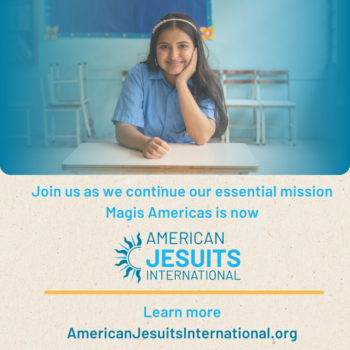“Education is always an act of hope that, from the present, looks to the future,” was one of Pope Francis’ opening messages at the Vatican Youth Symposium on December 16, 2020. With this simple but true statement, he invited us to reflect on the educational crisis that has intensified in the midst of the COVID-19 pandemic, leaving more than 90% of the world’s children out of school and more than 500 million with no access to distance learning. Education is an essential human right that not only serves as a door to access all other human rights, but also has the potential of leading us to the creation of societies, and in turn a world, in which dignity and justice for all are at the center. Simply put, education is one of the most important tools for social transformation.
We know that all situations of collective danger require immediate responses from authorities and communities. The COVID-19 pandemic has led us into a state of unprecedented crisis in which the most important systems (health, education, economy) for the functionality of our society have suffered. Even though these elements are equally important, the strengthening of educational systems, programs and institutions, supports communities at a deeper level as they build back up. Education provides stability and structure in communities by providing a physical and psychological space for safety, reinforcing the importance of community values, and forcing us to consider the ways in which knowledge and learning can determine the future of generations to come. Access to quality education is the gateway to a reality in which people can be agents of change in their own lives, allowing them to make their own choices and face adversities with dignity and strength.
However, the COVID-19 pandemic is not the first crisis our societies have faced. At various levels, we have lived through many crises, from political unrest to human rights violations to economic recensions and natural disasters. What has remained as a vital tool to overcome all of these situations has been education. In Venezuela, a nation that has suffered greatly in the past decade, organizations, like our partners Fe y Alegría, a popular education and social movement, have been working to ensure that every child in the country has access to education. For the past 65 years, this movement has greatly impacted the lives of thousands of Venezuelan students.
Erick Rodríguez, a former student at the very first Fe y Alegría school – Colegio Abraham Reyes, spoke with us about the impact that his education at Fe y Alegría had on his development. Erick was born in Caracas, Venezuela in the 23 de Enero neighborhood. He is one of five children and considered his upbringing to have been typical to his community. Daily activities and duties included going to church, playing baseball, getting water, food and newspapers. Harina de pan, a crucial ingredient for making arepas, was the most important item to have at home.
In the late 80s and early 90s, Venezuela started going through a change of regime, which would be the beginning of decades of social, political and economic turmoil. For Rodríguez, being only 7 years-old, this time came with many fears and uncertainty. Upon enrolling at Colegio Abraham Reyes Fe y Alegría, he recalls the school tried very hard to keep all students safe from violence and crime. “We had teachers who were dedicated to our education and overall our well-being. I am very grateful for that! Fe y Alegría represented my safe place away from home,” Rodríguez said.
Finding a place in which to feel safe and taken care of in the midst of a crisis is essential for the development of any child. When asked what was his greatest learning experience at Fe y Alegría, Rodríguez proudly said, “Fe y Alegría taught me that life is not always easy, but with hard work and perseverance you can move in the right direction.”
These words are powerful and relevant today, more than ever for all individuals. Education and guidance give individuals, like Rodríguez, the opportunity of finding spaces and moments to persevere and work hard.
Rodríguez has no doubt that Fe y Alegría, as an institution, was essential in his pathway to success, providing him with basic principles, values and structure. As he and his family moved to the United States and adapted to a new culture, language and educational system, he kept what he learned at Fe y Alegría close to his heart. He assures us that he is “here today because of the development of the early stages of my life”.
“Education is always an act of hope that, from the present, looks to the future.” Pope Francis’ words ring especially true over the last 12 months, as we once again reaffirm our belief that education is an essential tool for transformation and overcoming crises. Education is a tool for strengthening values such as solidarity, empathy, inclusion, and peace, all of which give us the capacity to overcome times of crisis and enable us to build a more just and equitable world.

